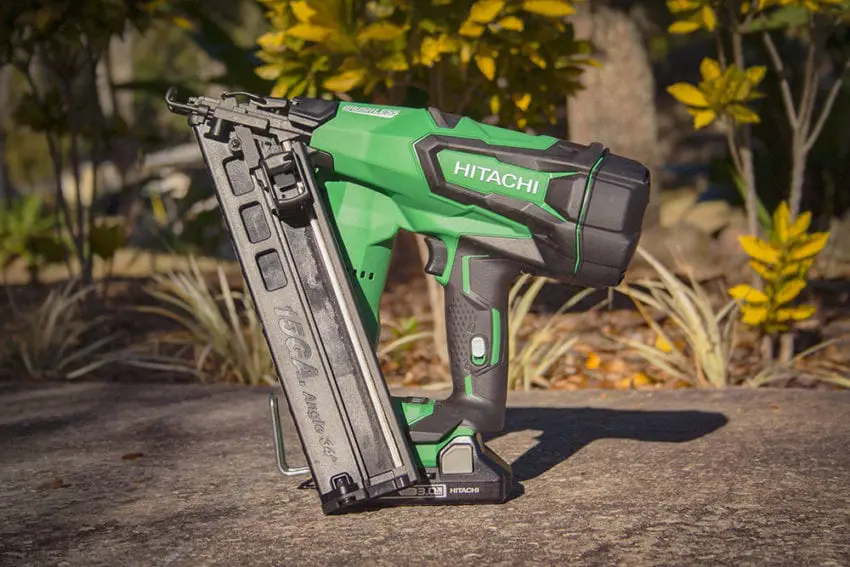Nailers aren’t just for the bones and roof of a building. We use them throughout the construction process for larger trim, molding, shelving, and door installation – hence the category known as finish nailers. They make quick, one-handed work out of slow, two-handed hit-the-nail-on-the-head work plus there’s no chance an errant swing can cause damage. Technology has freed some pneumatic tools from their air hose tethers and have now culminated in the brand new 34-degree Hitachi 15 Gauge Cordless Finish Nailer.
Without a compressor and hose or gas cartridge to fuel the drive, can 18 volts really get the job done?
It’s a recipe that has worked for most of the major brands – Milwaukee, Ryobi, Ridgid, DeWalt, Porter-Cable, and Makita all have cordless finish nailer lines. They each have their own pros and cons compared to each other and to pneumatic nailers.
The biggest concerns have been weight and delayed firing. While weight is still an obstacle, Hitachi claims to have solved the delay problem (Milwaukee has as well). That’s something I’ll definitely take a look at.
I had no shortage of installation work to do so I got down to business.
First Impressions
I used an 18-volt 15 gauge cordless finish nailer a few years ago from a manufacturer that will remain nameless and made it work for about a month. I know tools are improving at a furious pace, but I couldn’t help but be skeptical. However, the Hitachi made a good first impression because it’s light – much lighter than the nameless one I used in the past. Lighter is relative of course. It’s still heavier than your average pneumatic model.
Its polycarbonate resin body has plenty of non-marring rubberized material over the top cover and along the sides to protect floors, work surfaces, and the tool itself. It’s a really nice touch, especially since you’re likely using this nailer around other finished work.
Brushless motor technology extends tool life and allows for smarter tools. The Hitachi 15 Gauge Cordless Finish Nailer certainly looks sophisticated with a control panel that houses the power, actuation, and battery gauge buttons.
The hook is big enough for a truss or ladder and you can always hook it on your belt.
Other great features include a bright work light and safety lock on the handle. In practice, I’m not sure how often I’ll use the safety lock, but it shows Hitachi’s attention to detail on this nailer.
(Finish) Nailed It
Angled nailers have a bit of an advantage over their straight nailer brethren because they can reach more areas – such as corners – and be maneuvered more easily to accommodate the drive. Many carpenters find that installing base and crown molding is easier with an angled nailer, too. For this review I installed several exterior doors and completed a lot of punch list work. Not only is the Hitachi easy to work with, but being free of my usual pneumatic nailer’s air hose is fantastic.
Controls
I like the control panel. You press the power button and know it’s on when you see the green light. If the nailer isn’t used for 30 minutes, it shuts off automatically. There’s also an on-board battery gauge which is a fine substitute for the gauge on the battery itself. As we cut the cord on our tools, we have to know how much fuel we have in the tank.
There’s an actuation selection button to switch between sequential or contact actuation. Put more simply: single fire or bump fire mode. I don’t often use bump fire, but it’s a nice feature to have and it works well.
Depth of Drive
I first needed to adjust the depth of drive – which is easy to do with the thumb wheel – because it can shoot a nail completely through thinner stock. With the depth appropriately set, it drove nails at a consistent depth.
Ergonomics
The grip is great – very comfortable. That’s not a surprise since Hitachi is well known at Pro Tool Reviews for having among the best ergonomic designs for their handles and housings.
As I mentioned before, the weight is lighter than the first generation cordless nailers that made their way onto the scene. I found myself using this nailer instead of passing it off to one of my guys. That’s how much I like it and how comfortable I feel using it.
Performance
If you’re a cordless nailer veteran, the first thing you’ll notice when you pull the trigger is that Hitachi’s nailer fires immediately. The delay for motor cycling is gone. Hitachi accomplishes this with a compressed air tank in the nailer. You’ll eventually need to take it in to be refilled, but we’re talking tens of thousands of shots before that happens.
Hitachi claims you can fire 3.5 nails per second. Even though I wouldn’t try to work at that high a rate, everything I’ve done so far certainly supports the case that I won’t be working faster than the nailer can cycle.
At first I took the dry fire lockout as a malfunction, but it’s actually quite clever: when you get down to about three nails left on the stick, the push lever nose won’t depress any longer. It won’t let you dry fire because you never run out of nails. It’s a very cool feature.
Hitachi claims you’ll get 1,100 nails per charge using its new compact 3.0 amp hour battery, and I believe it. I have yet to charge it for my punch list work. If the claims hold up, you should easily be able to get a full day’s work in without having to recharge even if it becomes your primary finish nailer.
This thing just works. I haven’t had a jam yet and it never missed a drive. While I haven’t had to clear a jam yet, the latch is easy to unhinge if you have to without the need for additional tools.
The Bottom Line
At the end of the day, Hitachi did an admirable job keeping the weight reasonable for a cordless nailer, designed excellent ergonomics, and delivers outstanding performance with no ramp up time. I’m pretty sure this is now the cordless nailer that all others will be aiming to match.
Battery power for punch list work makes your life so much easier because you don’t have to roll out the big equipment for a few tasks only to roll it back up again. As a pneumatic replacement, the Hitachi 15 Gauge Cordless Finish Nailer is remarkably powerful and I wouldn’t be surprised if it many Pros go ahead and trade out their pneumatic finish nailers.
I can wholeheartedly recommend the Hitachi 15 Gauge Cordless Finish Nailer. I’ve been choosing it over my other nailers on recent jobs. There may be a bit of a sticker shock at $369. If you’re one that doesn’t mind the additional weight as a trade-off to losing the hose and compressor completely, Hitachi offers a pretty nice value proposition.
Hitachi 15 Gauge Cordless Finish Nailer Key Features
- No ramp up time
- Non-marring pads
- Dry fire lockout
- Safety lock
- Control panel with power, actuation, and battery gauge indicator
- 30-minute automatic shutoff
- Work light
- Ladder/belt hook
Hitachi 15 Gauge Cordless Finish Nailer Specifications
- Model number: NT1865DMA
- Power Souece: Hitachi 18V battery pack
- Housing: Polycarbonate resin
- Motor: Brushless
- Nail Size: 15 gauge
- Collation Angle: 34-degree
- Nail Length: 1-1/4- to 2-1/2-inch
- Nail capacity: 100
- Actuation: Sequential or bump
- Cycle rate: 3.5 nails/second
- Weight: 7.5 pounds
- Dimensions: 13-1/2 length x 12-5/32 width x 4-1/2-inches height
- Price: $332.10
- Warranty: Limited Lifetime










